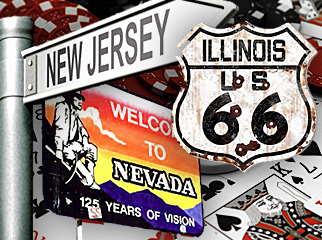 New Jersey’s Division of Gaming Enforcement published a 77-page preview of its draft online gambling regulations on Thursday, ahead of the final version that will be revealed on June 3. (Read the draft regs here.) A 60-day public comment period will follow, after which the DGE will make any necessary edits. There’s still no firm launch date for online play, but the DGE has promised to give Atlantic City’s dozen casinos a 45-day heads-up.
New Jersey’s Division of Gaming Enforcement published a 77-page preview of its draft online gambling regulations on Thursday, ahead of the final version that will be revealed on June 3. (Read the draft regs here.) A 60-day public comment period will follow, after which the DGE will make any necessary edits. There’s still no firm launch date for online play, but the DGE has promised to give Atlantic City’s dozen casinos a 45-day heads-up.
There are no changes to the previously stated license fees or tax rates. Sites are required to verify a player’s location when he or she logs on and must re-verify the player’s location on an hourly basis. As for moving money, players can deposit in person at the casinos or online via debit, credit or prepaid cards. Online deposits can be made from your casino deposit account but not from your personal bank account. Withdrawals can be made via the same card used to deposit, but only up to the amount the player originally deposited via that card. Excess winnings can be withdrawn in person or transferred online to a bank account the player has already registered (in person) with the casino. No transfers will be permitted between players on the site.
This week also brought the first draft of Illinois’ new standalone online gambling legislation. The text is largely identical to language originally included in the state’s SB 1739 gambling bill but removed prior to coming up for a vote by the state senate (apparently to pacify the state’s horseracing interests). Illinois’ current legislative session ends May 31, but should the bill fail to gain traction this month, it may reappear during the autumn ‘veto’ session free-for-all.
Illinois’ legislation would permit the signing of interstate compacts to share poker liquidity, provided the federal government doesn’t object. That’s good news for Nevada Gov. Brian Sandoval, who announced this week that he’d already had discussions along those lines with some of his counterparts in other states. Sandoval declined to specify exactly which states, although sources have told the Las Vegas Review-Journal’s Howard Stutz that Texas is a target. (Don’t tell Sandoval, but the Lone Star state’s most recent halfhearted attempt at passing online poker legislation failed to make it past the deadline for advancing beyond the committee stage.)
Sandoval qualified that his talks with other governors were “very much in the early stages,” but he was “hopeful that we’ll continue to talk.” (Memo to Sandoval: don’t bother calling California.) As for Nevada’s first and so far only operational online poker site, Sandoval claimed people were signing up for Ultimate Poker “from all over the world,” although they’ll have to travel to Nevada in order to actually play. Addressing complaints that the pace of sites garnering Nevada regulatory approval was somewhat snail-like, Sandoval cautioned that regulators were being “extremely careful” in their methodology, and that “over time, people will forget about that part and see how successful it will become.”
